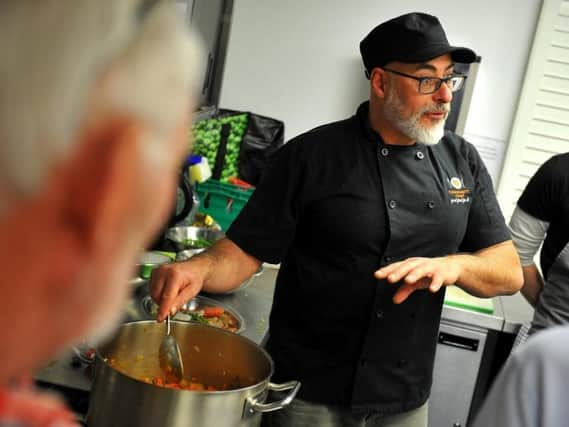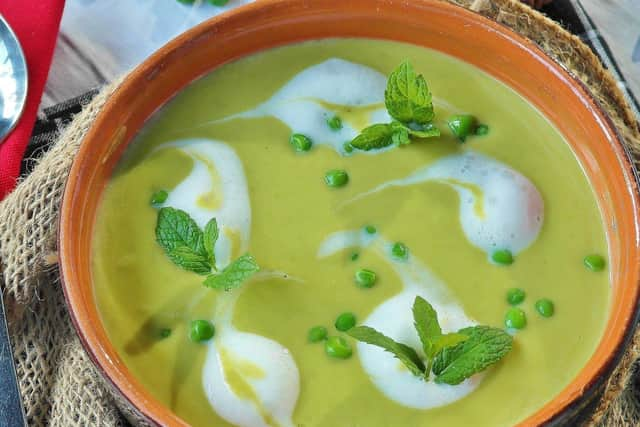The tips and tricks for perfect batch cooked meals in these tough times


Batch cooking is a great way to make the food you have last a little bit longer.
He said: “The benefits of batch cooking is that it saves time, energy and money. It can extend the life of fresh foot that needs using.
Advertisement
Hide AdAdvertisement
Hide Ad“I often find cooking is fun, creative and stimulating and you can get your family involved.”


Community Chef, based in Lewes, is a social enterprise, established as a community interest company. It is dedicated to promoting a sustainable food system which provides good food for all while supporting local food producers and most of the ingredients used are organic.
Robin advises that you start with dishes you are already familiar with and then progress with variations, and as your confidence and skills grow, so will your repertoire.
He explained: “If you want to experiment, start off with a small trial batch.
Advertisement
Hide AdAdvertisement
Hide Ad“Sauces, stews, soups and curries lend themselves to big pot cooking and can be frozen.


“Dips and salads are simple to make in bulk but have a shorter life.
“Savoury tray bakes like lasagne are easy to prepare in bulk and can be frozen
“Big cakes, quiches and pies are also best done as tray bakes.”
Advertisement
Hide AdAdvertisement
Hide AdA good way to start is to look at what perishable items need using up first and then design your menu with that in mind.
“A good cook is able to consistently produce a large amount of food which is as nourishing as it is delicious. A creative outlook, some reliable recipes and a good understanding of basic nutrition, ingredients, flavourings and cooking times are essential to being able to cook well in bulk.
“For some people, what they make will be determined by their skills, taste, budget, the audience and the amount of food needed.”
When it comes to storing the items in the fridge or freezer Robin advises that you make sure food is completely cold as if it is warm it will raise the temperature of your fridge or freezer.
Advertisement
Hide AdAdvertisement
Hide AdHe adds: “The general advice is to make sure food is cool, packages and “stabilised” in less than 90 minutes.
“Decanting big amounts of sauces or stews into shallow large trays increases the surface area open to the elements and helps cool food quickly. Make sure there is no risk of physical or biological contamination.
“When packaging for the fridge or freezer, label food with its name, ingredients, cooking instructions and the date. If you are doing batch cooking, keep a log of both frozen and refrigerated food and do stock control.
“You will need to have a batch number and know how many units of that batch were made.”
Advertisement
Hide AdAdvertisement
Hide AdHigh risk foods like rice, egg dishes, and some fish and poultry, which is refrigerated should be used within a day of making it. Sauces, stews etc have a better refrigerator shelf life.
He said: “Use appropriate storage containers and/or wrap foods for freezing and try to exclude as much air as you can. Keep a register of what food is in the freezer and rearrange it regularly so that food is not wasted. A full freezer is more economical to run.”
Food should be thawed overnight in the fridge, not at room temperature. Reheat food once only until it is up to 75˚C for a minimum of two minutes. And never refreeze food that has been frozen.
What to freeze:
- Small portion ready meals, soups, sauces, stews etc. freeze well.
Advertisement
Hide AdAdvertisement
Hide Ad- Raw meat and fish can usually be frozen for up to three months if frozen while still really fresh.
- Grated cheese freezes well, can be used straight from the freezer and keeps for up to four months.
- Some people prefer to blanch vegetables before freezing, by briefly boiling (blanching) for 30 seconds and then plunging into cold water. Though blanching is not necessary, vegetables prepared this way will be fresher looking and tasting for a longer period of time. Chopped onion can be frozen in plastic bags.
- Fruit that has been frozen may go a bit mushy when defrosted but is fine for cooking and making crumbles, smoothies and purées.
What not to freeze:
Advertisement
Hide AdAdvertisement
Hide Ad- Any sort of egg unless it is in a cooked mixture, such as a quiche or cake.
- Vegetables with a high water content, such as cucumber and lettuce.
- Egg-based sauces, such as mayonnaise, will separate and curdle. Plain lower-fat yoghurt, lower-fat cream or cottage cheese or single cream go watery.
What should people keep in mind when batch cooking?
Here are Robin’s ten tips for stress free successful bulk cooking:
1. Have a plan but try be flexible as stuff happens
Advertisement
Hide AdAdvertisement
Hide Ad2. Keep your dishes and menus simple - prepare food that you like and will want to eat again (and again)
3. Organize your fridge and freezer - make sure foot that needs to be used is easiest to get out.
4. Estimate a timeline for your production
5. Write shopping and prep lists for all of your dishes
6. Learn how to scale up your recipes
7. If leading a team, allocate clear tasks as too many cooks may spoil the broth
8. Keep a kitchen diary and label what you make.
9. Zone your kitchen and wash as you go.
10. Freeze in portion sizes suitable for your household.
He added: “The logistics of cooking in bulk are more complex, especially when one is cooking more than one dish.
Advertisement
Hide AdAdvertisement
Hide Ad“Mindfulness, organisation and heat control are key skills.Big pot stove cooking can be convenient and energy efficient. Some cooks like to throw everything into a pot, turn up the heat, stir like crazy and hope for a good result. The challenge is to ensure that ingredients with different cooking times are all cooked as you want them and that you have developed sufficient depth of flavour. You don’t want to make a bland stew with overcooked potatoes and undercooked beans . . .
“There is also the real risk of burning the bottom of the pot. If this does happen, stop cooking, plunge the pan into cold water, decant the top ¾ of the dish into another vessel or pan and start again.
“When cooking in bulk, the oven is a key tool. Roasting vegetables for example brings out great flavour and if one has a big oven with several shelves, you can put a vast amount of prepped ingredients through the oven to be assembled as you want.”
And Robin’s final piece of advice: “If you scale up a recipe, you don’t want to scale up the cookery time to the same conversion factor as your ingredients. Cooking times are seriously affected by the power of the stove or capacity of the oven. It’s often a case of trial and error. Keep notes and reflect on what works and what doesn’t.”
For more information on Robin, visit communitychef.org.uk
A message from the Editor, Gary Shipton:
Advertisement
Hide AdAdvertisement
Hide AdIn order for us to continue to provide high quality and trusted local news, I am asking you to please purchase a copy of our newspapers.
With the coronavirus lockdown having a major impact on many of our local valued advertisers - and consequently the advertising that we receive - we are more reliant than ever on you helping us to provide you with news and information by buying a copy of our newspapers.
Our journalists are highly trained and our content is independently regulated by IPSO to some of the most rigorous standards in the world. But being your eyes and ears comes at a price. So we need your support more than ever to buy our newspapers during this crisis.
Stay safe, and best wishes.
Comment Guidelines
National World encourages reader discussion on our stories. User feedback, insights and back-and-forth exchanges add a rich layer of context to reporting. Please review our Community Guidelines before commenting.